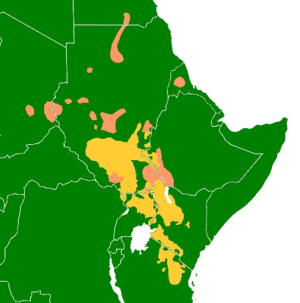| Eastern Sudanic | |
|---|---|
| (disputed) | |
| Geographic distribution | Egypt, Sudan, South Sudan, Eritrea, Ethiopia, Chad, Kenya, Tanzania, Uganda |
| Linguistic classification | Nilo-Saharan?
|
| Subdivisions | |
| Language codes | |
| ISO 639-5 | sdv |
| Glottolog | None |
 Eastern Sudanic languages: * Group k (orange) * Group n (yellow) | |
In most classifications, the Eastern Sudanic languages are a group of nine families of languages that may constitute a branch of the Nilo-Saharan language family. Eastern Sudanic languages are spoken from southern Egypt to northern Tanzania.
Nubian (and possibly Meroitic) gives Eastern Sudanic some of the earliest written attestations of African languages. However, the largest branch by far is Nilotic, spread by extensive and comparatively recent conquests throughout East Africa. Before the spread of Nilotic, Eastern Sudanic was centered in present-day Sudan. The name "East Sudanic" refers to the eastern part of the region of Sudan where the country of Sudan is located, and contrasts with Central Sudanic and Western Sudanic (modern Mande, in the Niger–Congo family).
Lionel Bender (1980) proposes several Eastern Sudanic isoglosses (defining words), such as *kutuk "mouth", *(ko)TVS-(Vg) "three", and *ku-lug-ut or *kVl(t) "fish".
In older classifications, such as that of Meinhof (1911), the term was used for the eastern Sudanic languages, largely equivalent to modern Nilo-Saharan sans Nilotic, which is the largest constituent of modern Eastern Sudanic.
Güldemann (2018) considers East Sudanic to be undemonstrated at the current state of research. He only accepts the evidence for a connection between the Nilotic and Surmic languages as "robust", while he states that Rilly's evidence (see below) for the northern group comprising Nubian, Nara, Nyima, Taman and Meroitic "certainly look[s] promising".[1] Glottolog (2023) does not accept even a Surmic–Nilotic relationship.
- ^ Güldemann, Tom (2018). "Historical linguistics and genealogical language classification in Africa". In Güldemann, Tom (ed.). The Languages and Linguistics of Africa. The World of Linguistics series. Vol. 11. Berlin: De Gruyter Mouton. pp. 299–308. doi:10.1515/9783110421668-002. ISBN 978-3-11-042606-9. S2CID 133888593.